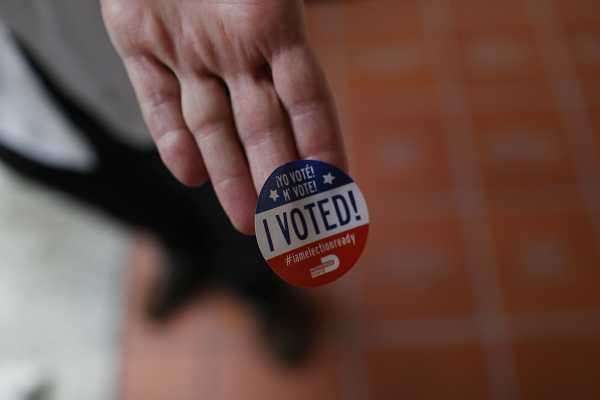
Florida may be on the verge of extending the right to vote to as many as 1.4 million people.
With Amendment 4, Florida voters have a chance to dramatically scale back one of the nation’s harshest voting laws for people with felony records. As it stands today, the great majority of people convicted of felonies in Florida can’t vote — even after they’ve finished their sentences (whether that entailed prison, probation, or something else).
Amendment 4 would change that, automatically restoring a person’s right to vote after they complete their sentences, with exceptions for people convicted of murder and felony sex offenses.
“At the end of the day, when a debt is paid, it’s paid,” said Desmond Meade, president of the Florida Rights Restoration Coalition, which has campaigned for Amendment 4. “We all want to be forgiven,” he added, referencing his own felony record.
In 2016, the Sentencing Project estimated that 6.1 million people convicted of felonies can’t vote in the US, including many still in prison, on probation, or on parole, and some who have completed their sentences. Florida, with its harsh law, made up more than a quarter of that total — with 1.6 million people in the state barred from voting in 2016. In total, more than 10.4 percent of Florida’s voting-age population couldn’t vote due to a felony record. (The national numbers are likely outdated because some states have relaxed their laws since 2016. But Florida, with its law still in place, remains a big outlier.)
So if Amendment 4 does pass, it will amount to the most significant expansion of voting rights in America in decades — since the women’s suffrage movement and federal Voting Rights Act of 1965.
What Florida’s Amendment 4 would do
Florida’s Amendment 4 would restore voting rights for people in the state convicted of felonies as long as they have completed their sentences, although anyone convicted of murder or felony sex offenses would be excluded.
Based on the Sentencing Project’s 2016 estimates, this would benefit more than a million people. The organization estimated in 2016 that nearly 1.5 million people in Florida have completed felony sentences but can’t vote — about 9.2 percent of the voting-age population in Florida. The total, though, includes some people convicted of murder and felony sex offenses, so not every one of those people would benefit under Amendment 4.
Black people, who are disproportionately arrested and incarcerated, would stand to benefit the most. In 2016, more than 418,000 black people out of a black voting-age population of more than 2.3 million, or 17.9 percent of potential black voters in Florida, had finished sentences but couldn’t vote due to a felony record, according to the Sentencing Project. (Again, this includes some people convicted of murders and felony sex offenses.)
The amendment is officially supported by Floridians for a Fair Democracy, which gathered more than 1.1 million petitions to put it on the ballot. It’s received bipartisan endorsements from the American Civil Liberties Union and the Koch brothers–backed Freedom Partners.
Public support for Amendment 4 seems very strong. Two polls this year from the University of North Florida found support at 71 percent — surpassing the 60 percent that the measure would need to pass. Another survey, from North Star Opinion Research and EMC Research, found 74 percent support.
But one survey by the Florida Chamber of Commerce earlier this year found only 40 percent support, with 43 percent undecided and 17 percent opposed. So far, this is an outlier compared to the other public polls done on the issue.
Florida has one of the strictest felony disenfranchisement laws in the US
One reason so many people stand to benefit from Amendment 4 is that Florida has one of the strictest disenfranchisement laws in the country for people convicted of felonies.
Most states have at least some voting restrictions for people convicted of felonies. Most often, the law bars people who are currently in prison from voting. Some prohibit voting until a person finishes parole or probation, too.
Florida, however, bars people from voting even after they’ve completed their sentences. Only two other states — Kentucky and Iowa — currently do this. Virginia technically does under its constitution, but former Gov. Terry McAuliffe (D) and current Gov. Ralph Northam (D) have used their executive powers to restore voting rights to those convicted of felonies.
Only Maine and Vermont let people vote regardless of their criminal record, which means that people in the two states can even vote from prison.
Courts, including the US Supreme Court, have generally upheld such voting restrictions under the US Constitution’s 14th Amendment, which suggests that the government may abridge the right to vote due to “participation in rebellion, or other crime.”
In Florida, there is a process in place for getting voting rights restored. But the process, set up by Gov. Rick Scott (R), is very arduous. It requires people to wait as long as seven years to apply, and the application review itself can take several additional years. Even after someone applies, restoration of voting rights is far from guaranteed: According to the Florida Commission on Offender Review, only 3,005 of more than 30,000 applicants have had their voting rights restored through the system since Scott implemented it.
As a result, Florida disenfranchises more potential voters than any other state, with more than 10 percent of all potential voters and more than 21 percent of potential black voters in Florida unable to vote due to felony records.
This affects a wide group of people, down to Floridians convicted of certain traffic crimes and nonviolent offenses. Amendment 4, supporters argue, is about giving these people a second chance.
Susanne Manning, a probationer with the Florida Rights Restoration Coalition, recalled a restoration case she’s working on: a military veteran who hasn’t been able to vote in the 19 years since his release from prison after getting caught driving with a suspended license, which can be charged as a felony after repeat offenses in Florida.
Amendment 4 “is going to affect people who have been waiting forever,” she said. “People who have done their time. People who have finished their sentence, done their probation, paid their court costs, paid their fines, paid their restitution — and have still been waiting.”
For supporters of Amendment 4, it’s a philosophical argument about second chances: After someone has done their time, shouldn’t they be able to transition back to society?
Amendment 4 has little serious opposition
So far, no official campaign has formed against Amendment 4 — a sign that the measure has very little in the way of serious opposition.
But there are some critics.
Floridians for a Sensible Voting Rights Policy, a conservative group, posted a short blog post criticizing the initiative last year. The post largely complained about Amendment 4 failing to differentiate between different kinds of people affected, claiming that, besides murder and felony sex offenses, the measure “treats many other violent crimes no differently than non-violent crimes” and “makes no distinction between one-time offenders and career criminals.”
Gov. Scott, who’s currently running for Senate against Democratic incumbent Sen. Bill Nelson, has suggested that he would prefer handling the restoration of voting rights on a case-by-case basis, through which people convicted of felonies have to show that they’re truly rehabilitated before they earn back their right to vote.
“The governor believes that in order for felons to have their rights restored, they have to demonstrate that they can live a life free of crime, show a willingness to request to have their rights restored and show restitution to the victims of their crime,” a spokesperson for Scott’s Senate campaign told the News Service of Florida.
Rep. Ron DeSantis, the Republican running for Florida governor against Democrat Andrew Gillum, shares similar views, according to a spokesperson.
The criticism is essentially a defense of the current system (which was, after all, set up by Scott). But as shown since it was implemented, the current system is sluggish: It fails to restore voting rights for the great majority of people in Florida convicted of felonies. It’s also out of line with what most states do, since most automatically restore voting rights upon the completion of a sentence.
It’s no coincidence that Republican and conservative groups are the most resistant. Because black people are disproportionately disenfranchised by these kinds of laws, and because black people tend to vote Democrat, there is a sense that Amendment 4 would be a boost to Democrats politically. In a swing state where a presidential election came down to a few hundred votes, this is a big deal.
But Amendment 4 supporters push back against that. They point out that 29.6 percent of those disenfranchised by the law in Florida today are black. While that is a disproportionate amount relative to the state’s population of black people (16.9 percent), it’s still a minority.
“I’m fighting just as hard for that guy who wants to vote for Donald Trump as the one who wishes he could have voted for President Obama,” Meade said. “It doesn’t matter how someone’s going to vote. If our decision whether or not to support something is based on how we think people are going to vote, there’s something wrong there.”
Still, there is some evidence that Amendment 4 would favor Democrats. As Ari Berman wrote in Mother Jones, “Of the ex-felons granted clemency under [former Gov. Charlie] Crist, 26 percent, or 40,000, registered to vote in the 2012 election, with 59 percent registering as Democrats, according to research by University of Pennsylvania professor Marc Meredith and Harvard doctoral candidate Michael Morse.”
Some criminal justice reformers oppose Amendment 4
Another source of opposition — a bit of a surprising one — is a certain set of criminal justice reformers.
Paul Wright, founder of the Human Rights Defense Center in Florida, made a case against Amendment 4 in an op-ed for the Tallahassee Democrat because it excludes people convicted of murder and felony sex offenses. Wright, who was previously convicted of first-degree felony murder in 1987 in Washington state, argued that if the amendment is really about extending second chances to people, that should apply to everyone, not just some.
“We don’t think that you fight discrimination and bigotry by perpetuating it and embracing it,” Wright told me. “I’m one of the people targeted for exclusion, and so far no one can tell me why I shouldn’t be able to vote.”
Wright said that if Amendment 4 passes, it will be difficult to get another opportunity to pass a constitutional amendment — which, like Amendment 4, would require 60 percent of voters to pass — that would allow the restoration of voting rights for people convicted of murder and felony sex offenses.
“Realistically, do you see anyone spending $15 million so murderers and sex offenders can get the right to vote?” he said, referencing the millions raised for Amendment 4. “And then who’s going to vote for it?”
It’s a solidarity argument: By excluding some of the criminal justice population, the ballot initiative has excluded some of the people who could have been lifted by a broader rising tide.
But supporters of Amendment 4 argue that if they had included the restoration of voting rights for people convicted of murder and felony sex offenses, the ballot initiative would have failed in front of voters. While some Amendment 4 supporters would like to restore everyone’s voting rights, or never take those rights away in the first place, they argue that Amendment 4 is at least an improvement over the current law in Florida.
“Florida is a difficult state to work with, a difficult state to actually run a citizen’s initiative,” Meade said. “We were very intentional in making sure that we were having conversations with Floridians — because at the end of the day, if the voters don’t want something, we’re not going to get it.”
Manning, for her part, goes back to the military veteran who’s been unable to vote for 19 years since his release due to what amounts to a felony traffic violation. At the very least, Amendment 4 will help him and others like him.
“When your debt is paid, it’s paid,” she said. “You should not be punished for the rest of your life.”
Sourse: vox.com






